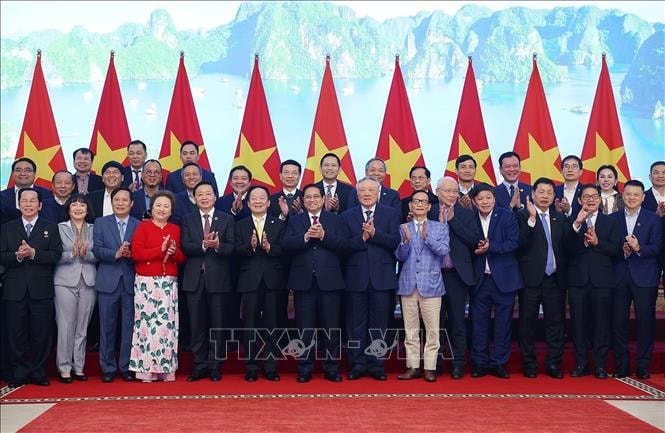Nearly 40 years of economic reform have marked Vietnam's resilience, breakthroughs, and determination to develop. From a centrally planned economy with low efficiency and a per capita income of only US$96 in 1989, Vietnam has made remarkable progress. By the end of 2025, the country is expected to enter the group of upper-middle-income nations, with an average income exceeding $5,000 per person per year. This achievement is not only the result of the Party's sound development strategy, characterized by bold and decisive institutional, policy, and integration reforms, but also the outcome of the hardworking, creative spirit, determination, and relentless efforts of the entire nation.

Party Chief To Lam during a meeting in March. Source: VNA
Even more impressive is Vietnam's consistently high economic growth rate, which has been double the average of other developing nations, despite global economic fluctuations. From a poor economy dependent on international aid, Vietnam has risen rapidly to become the world's 24th largest economy in terms of purchasing power parity (PPP). These accomplishments extend beyond the economic sector to significant social advancements, contributing to an increasingly prosperous and fulfilling life for the people.
The private sector has played a crucial role in this success. In the early stages of reform, the economy relied primarily on the state sector and foreign direct investment (FDI), while the private sector held a minor role. However, over the past two decades, especially after the Politburo issued Resolution 09 in 2011 and the Central Committee adopted Resolution 10 in 2017 on private sector development, this sector has surged to become a key pillar of the economy. It has increasingly proven to be the most important driver of national economic growth. With nearly one million enterprises and about five million individual business households, the private sector now contributes approximately 51% of GDP, over 30% of state budget revenue, and creates more than 40 million jobs, accounting for over 82% of the total workforce. It also provides nearly 60% of total social investment capital.
The private economy not only expands production, trade, and services but also plays a vital role in enhancing labor productivity, fostering innovation, and strengthening national competitiveness. Many Vietnamese private enterprises have successfully established themselves in the domestic market and gained international recognition. This demonstrates that, given a favorable business environment, Vietnamese enterprises can grow and compete on a global scale.
However, despite its increasing contributions, the private economy still faces numerous obstacles that hinder its growth and competitiveness. Many individual businesses continue to operate under outdated practices, lacking the motivation to transform into formal enterprises. Some even prefer to remain small to avoid regulatory burdens. Most private enterprises in Vietnam are small or micro-sized, with limited financial capacity and weak management. They lack strong linkages with each other and with foreign-invested enterprises, and they have not fully capitalized on opportunities from the Fourth Industrial Revolution. Many private businesses are slow to adopt digital transformation, invest little in research and development (R&D), and pay insufficient attention to business model innovation, technology upgrades, or new product development. As a result, it is difficult for them to enhance value creation, improve competitiveness, and achieve global standing.
Beyond internal weaknesses, private enterprises also face challenges in accessing key resources, particularly credit, land, natural resources, and high-quality human capital, especially in technology, engineering, and finance. Meanwhile, some state-owned enterprises control large amounts of land, capital, and skilled labor but fail to utilize them effectively, leading to inefficiencies and wastage. Additionally, Vietnam's legal framework remains inconsistent and overlapping, while the business environment is still fraught with bureaucratic obstacles. Complex administrative procedures impose high costs and risks, and in some cases, business freedom and property rights are undermined by the incompetence or abuse of power by certain officials.
Moreover, government support policies have not been truly effective or equitable across different economic sectors, making it difficult for private enterprises to access them. State-owned enterprises and foreign companies often receive more favorable treatment. State-owned enterprises have easier access to land and credit, while foreign enterprises enjoy better tax incentives, streamlined customs procedures, and land-use advantages. Corruption and informal costs persist, creating an invisible burden on private businesses, reducing efficiency, and discouraging investment expansion.

Prime Minister Pham Minh Chinh during a meeting with representatives of the private sector in early February.
Clearly, many of the challenges facing private enterprises stem from institutional and policy shortcomings as well as weaknesses in the business environment. These bottlenecks not only restrict the growth of the private sector—keeping its share of GDP stagnant for over a decade—but also hinder Vietnam's ability to increase value-added production, escape the middle-income trap, and accelerate its transition to a high-income economy by 2045, in line with the Party's resolutions and public expectations.
To align with the nation's broader vision, the private sector must clarify its mission and aspirations. It must take the lead in this new era, successfully driving industrialization and modernization, enhancing national competitiveness, and fulfilling social responsibilities. It should contribute to improving people's livelihoods, fostering a modern and civilized society, and shaping a dynamic and internationally integrated Vietnam. The private sector must strive to become a core economic force, leading in technological application, innovation, and creativity, with the goal of contributing around 70% of GDP by 2030. More Vietnamese private enterprises should achieve global competitiveness, master advanced technologies, and deeply integrate into international value chains and supply networks. Together with the entire nation, the private sector should help build an independent, resilient, and prosperous Vietnam.
To enable the private sector to fulfill this mission and realize its ambitious vision, the most critical requirement is continued bold reforms in institutions, policies, and the business environment. These reforms must unlock the private sector's full potential, allowing it to drive the economy's expansion into global markets. A strong national economy cannot rely solely on the state sector or foreign investment; it must be built on a robust domestic private sector that spearheads innovation and national development. True national prosperity requires the active participation of all citizens in wealth creation, fostering a society where every individual and every household is dedicated to hard work and progress.
To meet this imperative, the entire political system must reinforce its understanding and commitment to the private sector as the foremost driver of national economic growth. This demands a fundamental shift in policy-making, addressing existing shortcomings while leveraging the strengths of the market mechanism to support private enterprises in improving productivity and fostering innovation. The state must adopt a regulatory approach suited to a market economy, ensuring business freedom, property rights, and fair competition for the private sector. All barriers must be dismantled, policies must be made transparent, and interest groups must be eliminated from policy-making and resource allocation, ensuring a level playing field for all economic actors.